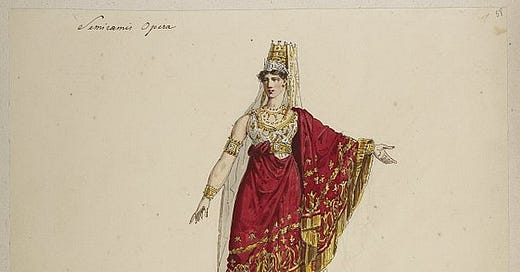Opera Daily 🎶 — Semiramide
This week's Opera Daily features “Bel raggio lusingier,” a soprano aria from Act I of the Italian opera Semiramide
👋 Hello to the new Opera Daily subscribers who have joined us this week. I hope you’re sitting on a comfortable couch with a warm beverage and enjoying your weekend. You can check out the complete Opera Daily archives and the playlist on YouTube for more selections. If you were forwarded this email by a friend, join us by subscribing here:
Today we’re listening to…
“Bel raggio lusingier,” a soprano aria from Act I of the Italian opera Semiramide by Gioachino Rossini.
🌟 Spotlight on Joan Sutherland: Joan Sutherland never fails to deliver what is required by the composer, Rossini. This is bel canto at its finest. Often hailed as “La Stupenda,” Joan Sutherland is synonymous with the bel canto style. Originating from the Italian for "beautiful singing," bel canto emphasizes the beauty of pure vocal skill, focusing on breath control, agility, and pitch perfection. Sutherland's voice, with its incredible range and clarity, made her one of the foremost interpreters of this style.
When it comes to Rossini, her performances are nothing short of mesmerizing. In “Bel raggio lusinghier,” she not only captures the technical demands but also the emotional depth, embodying the essence of bel canto. Her voice, a blend of power and brilliance, moves with the agility that Rossini envisioned.
I promise you, this aria is incredibly difficult to sing, but she makes it sound effortless.
🎧 Treat Your Ears: (6 minute listen): Soprano Joan Sutherland singing “Bel raggio lusinghier” from Gioachino Rossini’s Semiramide, 1960
A Glimpse into Semiramide:
Premiere: Venice, February 3, 1823.
Rossini's Prowess: In just a decade (1812-1822), Rossini crafted 30 operas, showcasing his unparalleled genius.
Inspiration: The opera’s tale is adapted from Voltaire’s tragedy, Semiramis (1748).
Before the Spotlight Shines: For 15 years, Semiramide has ruled Babylon. With a dark secret of regicide (the action of killing a king) and a missing heir, she's on the brink of announcing her successor. As the curtains rise, emotions run high with love, deception, and a shocking revelation. While there are other obvious candidates for the throne, Semiramide falls for Arsace, a military leader who is summoned back to Babylon. In this Act I aria, Semiramide expresses joy that Arsace has returned to her side. Although she does not realize he is in love with another and that he is actually her son, and she is in love with him!
The Great Debate: The opera world once buzzed with debates over Joan Sutherland vs. Maria Callas. While both are iconic, there's a unique charm in Sutherland's voice that resonates with many. As a wise opera enthusiast once remarked, "Callas transformed opera. But Sutherland? She was the voice."
🎼 Craving More? Dive into the full opera with Marilyn Horne. The overture is a must-listen!
Grateful for your time and ears,
Michele
PS. Missed our last edition? We featured Soprano Mirella Freni singing “Poveri fiori”, Adriana’s aria from Act IV of the Italian opera Adriana Lecouvreur
❤️ Loved this week’s piece? Show your appreciation with a like, and feel free to share!




I remember a delightful Joffrey Ballet that used the Overture to SEMIRAMIDE titled Confetti. I brought a colleague from Rome to this Met revival of SEMIRAMIDE that fell flat. The recent televised revival was not much better. Sutherland and Horne have not been equalled in these roles and may never be. Helas; but CONFETTI was a delight with Rossini's overture.
One thing that is consistently reinforced for me as I read your entries is that the plots of opera are way more demented than the modern Netflix writer could ever dream up. And yet somehow when you channel the drama (melodrama?) into song, it becomes glorious. A good life lesson for this singer.